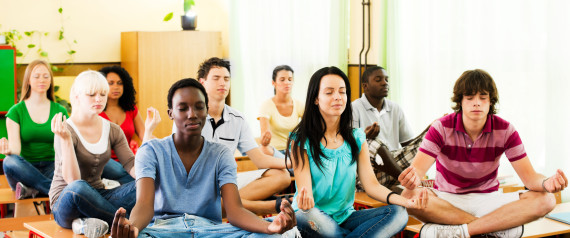
Why does one even bother to meditate? If you were to ask an individual with looming deadlines, an air-tight schedule, a demanding work ethic, and a partridge in a pear-tree, why they bust their hump, they might just think you're crazy. Imagine, an archetype of this very hustle-and-bustle lifestyle, who of course has no time to meditate, may just retort with a witty clichèd comeback--something to the tune of: "Why do you think I work? For my health? " Does that sound about right or am I relying too heavily on American idioms? Culture criticisms aside, one principal that crosses cultures is that of good health. Mediation is a paradigm shift for everyday living. By and large, anyone from the desperate housewife to the busy individual needs to meditate and here's the kicker--it is good for your health!
Now, while this first-page-worthy news may come as no great surprise, many are still ignorant to the ways in which a brief ten-minute meditation once a day can significantly impact one's everyday life. For the sake of argument, let's use high school students as an example.
In the city of brotherly love, the William W. Bodine High School for International Affairs, one of Philadelphia's blue-ribbon high schools, is known for offering the most successful International Baccalaureate Diploma Program (the IB) for its juniors and seniors in the city by count of IB diplomas and certificates earned. The IB program is committed to excellence and "has a hard-earned reputation for high standards of teaching, pedagogical leadership and student achievement" (ibo.org). To the students of Bodine who are in the program, this translates to stress, stress, sleep deprivation, and more stress. As a student of the program, I can attest to the simple fact that when high school students feel stressed, we tend to procrastinate; starting work on time has just gone out-of-style -- let's admit this. Then, surprisingly (or not so surprisingly), post procrastination, we're stressed-out tenfold; wait, why is procrastination in-style again? If only there was a way to block the seemingly urgent traffic of thoughts, impending due dates, and disconcerting test schedules. Oh, wait, there is!
Subscribing to the foundation of meditation, allowing one's self to be completely present and unbothered, to be in-the-moment, attributes to an organically keen sense of awareness. When one is aware of how they feel and are able to then separate the emotional responses from the logical responses and realize the physical responses all at the same time, then they have truly stepped outside of themselves. Taking a quick commercial-break from life's perpetual list of responsibilities and demands truly allows one to think about how and why they are thinking the way they were and why they were so stressed to begin with. This brand of socratic speculation, allows for a more tranquil and calculated response to life's problems, as opposed to the adrenalin inducing signals that our brain instinctively direct messages to our nervous systems when we become overwhelmed. That's another thing -- direct messaging.
The fact that my generation is so plugged-in, yields the depreciation of their productivity and creativity by the hour. Multi-tasking and peer pressures are now, conveniently, just a login away. Mediation, forcing one to be one with oneself exclusively without the presence of technology or stress, is a much needed paradigm shift in the everyday lives of teens. We are the future of the world, ergo, meditation has never been so requisite in life. For, if teens adopt the habit of good health practices, those very habits just may stick around for the next generation -- in which case, there will be a change in the way in which we take on the world. If we become less focused on the motivators which only recognize competition (extrinsic motivators; money and status) and prioritize the means to improve ourselves (the intrinsic motivators; the intangible), then we may hope for more creativity and for the much needed presence of a deeply ingrained health consciousness in our world.
Lucky for our world, Ms. Amy Edelstein, an author, educator, and public speaker, has volunteered to teach my class and me mindfulness practices in meditation. The well-seasoned Cornell University College Scholar, brings her thirty-years of experience as well as her contemporary philosophical perspective to the table every Tuesday, as an attempt to make our minds a better place. "I found the students at Bodine unusually receptive, interested, and able to work with the mindfulness tools. What's interesting is, even the students who don't seem to be paying attention, are absorbing quite a lot and are thinking about this and understanding their experience in different ways, so I think it's incredibly valuable," concludes Ms. Edelstein when asked about her experience with me and the students in my class. Ms. Edelstein also offers that, "The program at Bodine is a combination of mindfulness and cultural development. So, it teaches a context for our experience. Students are learning to cultivate objectivity on the nature of the mind, thought, feeling and understanding [of] how the brain developed and the understanding of the teenage brain. Also, [understanding] socially where we are, from the shift from modernity to post-modernity. So we understand that the stresses, the confusion, and the competing motives that students suffer from, are also the result of a lot of different cultural and biological factors, and when they experience it in this way, they have more control over it. More control over their choices, really."
In this generation of innovation, meditation may just very well be, the anchor we all need to sustain our demanding lives. Whether you are an accomplished monk who practices meditation in the enchanting forests of Eurasia or a busy CEO of a fortune-five-hundred company with only ten minutes of breathing room a day, meditation is a practical means to stress management, personal growth, and to truly connecting with the world around you.
Bodine was a test run. Let us now begin to follow the evolution of meditation with the mission of encouraging the implementation of meditation education in high schools world wide.

No comments:
Post a Comment